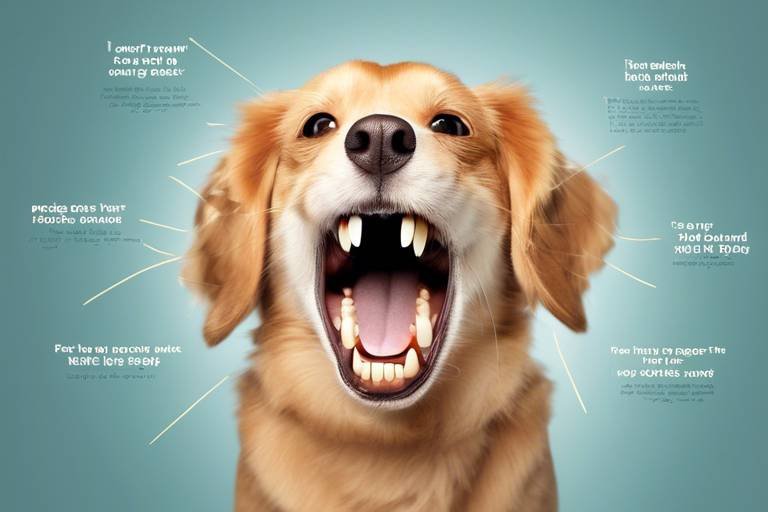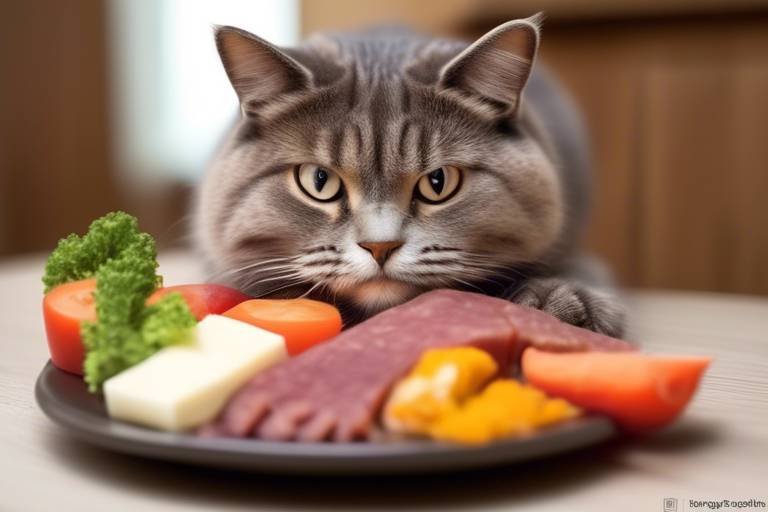The Benefits of Enriching Your Pet’s Diet
When it comes to our furry companions, their diet is one of the most crucial aspects of their overall well-being. Just like us, pets thrive on nutrient-rich foods that provide the essential vitamins and minerals needed for a happy, healthy life. You might wonder, why should I bother enriching my pet’s diet? Well, let me tell you, the benefits are numerous and can dramatically improve your pet's quality of life. From enhancing their energy levels to boosting their immune system, a well-rounded diet is the foundation of a long and vibrant life for your beloved animal.
Imagine your pet bounding around the yard, full of energy and enthusiasm. This isn’t just a dream; it can be a reality with the right nutritional choices. Enriching your pet's diet means not only providing them with food but also giving them the right kind of food—one that is packed with high-quality ingredients and a variety of nutrients. This leads to a healthier lifestyle, allowing your pet to enjoy many more years of playtime and companionship.
Moreover, dietary enrichment can help prevent various health issues. For example, many common ailments in pets, like obesity and diabetes, can be linked to poor nutrition. By being proactive and adjusting your pet’s diet, you can avoid these pitfalls. Think of it as a form of preventive medicine; just like you wouldn’t ignore your own health, why would you do the same for your pet?
In the following sections, we will dive deeper into the specific benefits of enriching your pet's diet, including improved health and longevity, enhanced energy levels, and even behavioral benefits. We will also explore the importance of ingredient quality, the impact of whole foods versus processed foods, and how variety in their meals can keep your pet excited about mealtime. So, buckle up as we embark on this journey towards a healthier, happier life for your furry friend!
A well-rounded diet significantly contributes to your pet's health and lifespan. Nutrient-rich foods can prevent diseases and promote vitality, ensuring your pet enjoys a longer, more active life. Just think of it as fueling a car with premium gas versus regular fuel; the better the fuel, the better the performance. Similarly, a diet rich in nutrients helps your pet perform at their best.
Feeding your pet a balanced diet can boost their energy levels. This increased vitality allows for more playtime and exercise, fostering a happier and more active lifestyle for your pet. Imagine your pet as a battery; the more you charge it with the right nutrients, the longer it lasts. A well-nourished pet is not only energetic but also more engaged and playful.
The quality of ingredients in your pet's food plays a crucial role in their overall health. Choosing high-quality proteins, fats, and carbohydrates can lead to better digestion and nutrient absorption. When you choose foods with recognizable ingredients, you can be sure that your pet is getting the best possible nutrition. Think of it as selecting fresh produce from a farmer's market instead of canned goods from a shelf; the difference is palpable.
Whole foods provide essential nutrients without the additives found in processed foods. Understanding the differences can help you make informed choices about your pet's diet. For instance, whole meats, vegetables, and grains are rich in nutrients, while processed foods often contain fillers and preservatives that can be harmful in the long run.
Incorporating a variety of ingredients into your pet's diet can prevent boredom and stimulate their appetite. A diverse diet ensures they receive a wide range of nutrients essential for their health. Just like humans, pets enjoy a mix of flavors and textures. You wouldn’t want to eat the same meal every day, would you? Neither does your pet!
Dietary enrichment can aid in maintaining a healthy weight for your pet. Proper nutrition helps prevent obesity and associated health issues, ensuring your pet stays fit and active. A balanced diet can be compared to a well-tuned engine; it runs smoothly and efficiently, reducing the risk of breakdowns—or in this case, health problems.
A balanced diet rich in fiber and probiotics can enhance your pet’s digestive health. Proper nutrition promotes gut health, leading to fewer digestive issues and improved nutrient absorption. Think of your pet’s gut as a garden; you want to nourish it with the right ingredients to help it flourish.
Recognizing signs of digestive problems in your pet is essential. Symptoms like vomiting or diarrhea can indicate the need for dietary adjustments to improve their overall health. Keeping an eye on your pet’s bathroom habits can provide valuable insights into their digestive health.
Selecting appropriate supplements can further enrich your pet's diet. Understanding which vitamins and minerals are beneficial can help you tailor their nutrition to meet specific health needs. Think of supplements as the icing on the cake; they can enhance the overall nutritional profile of your pet's diet.
A well-nourished pet often exhibits better behavior. Proper nutrition can lead to reduced anxiety and improved mood, making for a happier and more well-adjusted companion. Just as a balanced diet can affect your mood, it can do the same for your pet. A happy pet means a happy home!
Certain nutrients can influence your pet's mood and behavior. Understanding the link between diet and mental health can help you make choices that promote emotional well-being. For example, omega-3 fatty acids found in fish can have a calming effect, while a diet high in sugars can lead to hyperactivity.
A healthy diet can enhance your pet's ability to learn and obey commands. Proper nutrition supports cognitive function, making training sessions more effective and enjoyable for both you and your pet. Think of it as giving your pet the mental tools they need to succeed.
- What are the best ingredients to look for in pet food? High-quality proteins, whole grains, and fresh fruits and vegetables are excellent choices.
- How can I tell if my pet is overweight? A simple way is to feel your pet's ribs; they should be easily felt but not visible.
- Can I feed my pet human food? Some human foods are safe, but always check which ones are healthy for pets.
- How often should I change my pet’s diet? It's best to gradually introduce new foods and monitor your pet's reaction.

Improved Health and Longevity
This article explores the various advantages of enhancing your pet's nutrition, including improved health, energy levels, and overall well-being. Discover how dietary enrichment can lead to a happier, healthier life for your furry friends.
A well-rounded diet significantly contributes to your pet's health and lifespan. Just like us, our furry companions thrive on nutrient-rich foods that can prevent diseases and promote vitality. Imagine your pet as a little engine; the better the fuel you put in, the longer and more efficiently it runs! When you prioritize their nutrition, you're not just feeding them; you're investing in their future.
Research indicates that pets fed a balanced diet tend to live longer, healthier lives. This means fewer trips to the vet for ailments that could have been prevented with proper nutrition. Not only does a good diet enhance physical health, but it also supports their immune system, making them less susceptible to infections and illnesses. A strong immune system is like a fortress, keeping your pet safe from various threats.
Moreover, let's talk about the importance of quality ingredients. When choosing pet food, always look for high-quality proteins, fats, and carbohydrates. For instance, whole meats, fruits, and vegetables can lead to better digestion and nutrient absorption. This is crucial because if your pet isn't absorbing nutrients, they're not getting the full benefit of their food. It's like trying to fill a bucket with holes—no matter how much you pour in, it won't hold!
| Type of Food | Benefits | Examples |
|---|---|---|
| Whole Foods | Rich in nutrients, no additives | Chicken, carrots, brown rice |
| Processed Foods | Convenient but may contain fillers | Canned pet food, kibble |
But it's not just about the type of food; it's also about variety. Incorporating a diverse range of ingredients into your pet's diet can prevent boredom and stimulate their appetite. Think of it this way: if you had to eat the same thing every day, wouldn't you get tired of it? Pets are no different! A varied diet ensures they receive a wide range of nutrients essential for their health. It's like a colorful palette, giving your pet's meals a vibrant and appealing look that excites their taste buds.
Ultimately, enriching your pet's diet is a simple yet profound way to enhance their health and longevity. By focusing on quality ingredients, variety, and balanced nutrition, you're ensuring that your beloved companion enjoys a longer, healthier, and happier life. So, next time you shop for pet food, remember: you're not just buying a meal; you're investing in their future!
- What are the signs of a healthy diet for my pet? Look for shiny fur, bright eyes, and a healthy weight.
- Can I mix different types of food? Yes, but ensure they complement each other and consult with your vet.
- How do I know if my pet has dietary issues? Watch for changes in appetite, weight, or behavior, and consult your veterinarian.

Enhanced Energy Levels
This article explores the various advantages of enhancing your pet's nutrition, including improved health, energy levels, and overall well-being. Discover how dietary enrichment can lead to a happier, healthier life for your furry friends.
A well-rounded diet significantly contributes to your pet's health and lifespan. Nutrient-rich foods can prevent diseases and promote vitality, ensuring your pet enjoys a longer, more active life.
Feeding your pet a balanced diet can boost their energy levels significantly. Just like us, pets thrive on the right mix of nutrients, which not only fuels their bodies but also enhances their overall mood and activity levels. Imagine how you feel after a hearty, nutritious meal—your pet experiences that same surge of vitality! This increased energy allows for more playtime and exercise, fostering a happier and more active lifestyle for your pet.
When considering the energy levels of your pet, it’s essential to focus on the quality of the ingredients in their food. High-quality proteins, healthy fats, and complex carbohydrates are the building blocks of energy. For instance, proteins from real meat sources are more beneficial than those from by-products, as they provide the essential amino acids your pet needs to thrive. A diet rich in whole foods can make a world of difference, ensuring that your pet has the stamina to enjoy their daily adventures.
Here are some key components to look for when enhancing your pet's diet for better energy:
- High-Quality Proteins: Choose foods that list real meat as the first ingredient.
- Healthy Fats: Omega-3 and Omega-6 fatty acids support brain and heart health.
- Complex Carbohydrates: Ingredients like sweet potatoes and brown rice provide long-lasting energy.
Moreover, it’s important to consider the portion sizes. Overfeeding can lead to obesity, which in turn drains energy levels and can lead to a host of health issues. Regularly monitoring your pet’s weight and adjusting their food intake accordingly can help maintain their energy levels at an optimal state.
Incorporating a variety of foods into your pet's diet can also be beneficial. Just like humans, pets can get bored with the same meals day in and day out. A diverse diet not only keeps mealtime exciting but also ensures that they receive a broad spectrum of nutrients. Think of it as a buffet for your furry friend—varied options lead to better satisfaction and increased energy for play and exploration!
To sum it up, enhancing your pet's diet can lead to remarkable improvements in their energy levels. By focusing on quality ingredients, maintaining proper portion sizes, and introducing variety, you can ensure that your pet is not only well-fed but also ready to tackle whatever the day brings!
A balanced diet rich in fiber and probiotics can enhance your pet’s digestive health. Proper nutrition promotes gut health, leading to fewer digestive issues and improved nutrient absorption.
Recognizing signs of digestive problems in your pet is essential. Symptoms like vomiting or diarrhea can indicate the need for dietary adjustments to improve their overall health.
Selecting appropriate supplements can further enrich your pet's diet. Understanding which vitamins and minerals are beneficial can help you tailor their nutrition to meet specific health needs.
A well-nourished pet often exhibits better behavior. Proper nutrition can lead to reduced anxiety and improved mood, making for a happier and more well-adjusted companion.
Certain nutrients can influence your pet's mood and behavior. Understanding the link between diet and mental health can help you make choices that promote emotional well-being.
A healthy diet can enhance your pet's ability to learn and obey commands. Proper nutrition supports cognitive function, making training sessions more effective and enjoyable for both you and your pet.
Q: How can I tell if my pet's diet is adequate?
A: Look for signs of good health such as a shiny coat, healthy weight, and consistent energy levels. Regular vet check-ups can also provide insights into your pet's nutritional needs.
Q: Are there any specific foods that can boost my pet's energy?
A: Yes! Foods rich in high-quality proteins, healthy fats, and complex carbohydrates are excellent for energy. Always consult your vet before making significant changes to your pet's diet.
Q: How often should I change my pet's diet?
A: It's best to introduce new foods gradually to avoid digestive upset. You can change their diet every few months to keep it interesting, but always consult with your vet for personalized advice.
Quality of Ingredients
This article explores the various advantages of enhancing your pet's nutrition, including improved health, energy levels, and overall well-being. Discover how dietary enrichment can lead to a happier, healthier life for your furry friends.
A well-rounded diet significantly contributes to your pet's health and lifespan. Nutrient-rich foods can prevent diseases and promote vitality, ensuring your pet enjoys a longer, more active life.
Feeding your pet a balanced diet can boost their energy levels. This increased vitality allows for more playtime and exercise, fostering a happier and more active lifestyle for your pet.
The quality of ingredients in your pet's food plays a crucial role in their overall health. When you think about it, you wouldn’t want to fuel your body with junk, right? The same goes for your pets! Choosing high-quality proteins, fats, and carbohydrates can lead to better digestion and nutrient absorption, which ultimately translates to a happier and healthier pet.
For instance, look for foods that list whole meats as the first ingredient, such as chicken, beef, or fish. These are packed with the essential amino acids your pet needs to thrive. On the flip side, avoid foods that list vague terms like "meat by-products" or "animal meal," as these can be low-quality and less nutritious.
Moreover, understanding the difference between whole foods and processed foods is vital. Whole foods provide essential nutrients without the additives found in processed foods. Here’s a quick comparison:
| Whole Foods | Processed Foods |
|---|---|
| Natural ingredients | Often contain fillers and additives |
| Higher nutrient density | Lower nutrient density |
| Better for digestion | Can lead to digestive issues |
Additionally, incorporating a variety of ingredients into your pet's diet can prevent boredom and stimulate their appetite. Think of it like this: just as we enjoy a colorful plate of food, pets appreciate variety too! A diverse diet ensures they receive a wide range of nutrients essential for their health.
Dietary enrichment can aid in maintaining a healthy weight for your pet. Proper nutrition helps prevent obesity and associated health issues, ensuring your pet stays fit and active.
A balanced diet rich in fiber and probiotics can enhance your pet’s digestive health. Proper nutrition promotes gut health, leading to fewer digestive issues and improved nutrient absorption.
Recognizing signs of digestive problems in your pet is essential. Symptoms like vomiting or diarrhea can indicate the need for dietary adjustments to improve their overall health.
Selecting appropriate supplements can further enrich your pet's diet. Understanding which vitamins and minerals are beneficial can help you tailor their nutrition to meet specific health needs.
A well-nourished pet often exhibits better behavior. Proper nutrition can lead to reduced anxiety and improved mood, making for a happier and more well-adjusted companion.
Certain nutrients can influence your pet's mood and behavior. Understanding the link between diet and mental health can help you make choices that promote emotional well-being.
A healthy diet can enhance your pet's ability to learn and obey commands. Proper nutrition supports cognitive function, making training sessions more effective and enjoyable for both you and your pet.
- What are the best ingredients to look for in pet food? High-quality proteins, whole grains, and fresh fruits and vegetables are great choices.
- How can I tell if my pet's food is of good quality? Look for clear labeling, whole ingredients, and avoid foods with fillers or artificial preservatives.
- Is it necessary to add supplements to my pet's diet? It depends on your pet's specific needs; consult with a veterinarian for personalized advice.
Whole Foods vs. Processed Foods
This article explores the various advantages of enhancing your pet's nutrition, including improved health, energy levels, and overall well-being. Discover how dietary enrichment can lead to a happier, healthier life for your furry friends.
A well-rounded diet significantly contributes to your pet's health and lifespan. Nutrient-rich foods can prevent diseases and promote vitality, ensuring your pet enjoys a longer, more active life.
Feeding your pet a balanced diet can boost their energy levels. This increased vitality allows for more playtime and exercise, fostering a happier and more active lifestyle for your pet.
The quality of ingredients in your pet's food plays a crucial role in their overall health. Choosing high-quality proteins, fats, and carbohydrates can lead to better digestion and nutrient absorption.
When it comes to your pet's diet, the choice between whole foods and processed foods can have a profound impact on their health. Whole foods, which are minimally processed and close to their natural state, provide a wealth of essential nutrients without the unnecessary additives that often accompany processed foods. Think of whole foods as the fresh fruits and vegetables we enjoy ourselves, bursting with vitamins and minerals, while processed foods can be likened to fast food—convenient but often lacking in nutritional value.
Whole foods offer a variety of benefits:
- Higher nutrient density
- Fewer preservatives and artificial ingredients
- Better digestibility
On the other hand, processed foods may contain fillers and artificial flavors that can lead to health issues over time. They are often designed for convenience, but this convenience can come at a cost. For instance, many commercial pet foods are packed with grains and by-products that can cause allergies or digestive problems in some pets.
To illustrate the differences, consider the following table:
| Aspect | Whole Foods | Processed Foods |
|---|---|---|
| Nutritional Value | High | Variable |
| Additives | Minimal | Often Contains |
| Digestibility | Better | Can Be Poor |
| Cost | Generally Higher | Generally Lower |
Choosing whole foods can lead to a more balanced and nutritious diet for your pet, ultimately contributing to their overall health and vitality. So, next time you're at the pet store or the grocery aisle, consider what you’re putting in your pet's bowl. It’s not just food; it’s their fuel for life!
Dietary enrichment can aid in maintaining a healthy weight for your pet. Proper nutrition helps prevent obesity and associated health issues, ensuring your pet stays fit and active.
A balanced diet rich in fiber and probiotics can enhance your pet’s digestive health. Proper nutrition promotes gut health, leading to fewer digestive issues and improved nutrient absorption.
Recognizing signs of digestive problems in your pet is essential. Symptoms like vomiting or diarrhea can indicate the need for dietary adjustments to improve their overall health.
Selecting appropriate supplements can further enrich your pet's diet. Understanding which vitamins and minerals are beneficial can help you tailor their nutrition to meet specific health needs.
A well-nourished pet often exhibits better behavior. Proper nutrition can lead to reduced anxiety and improved mood, making for a happier and more well-adjusted companion.
Certain nutrients can influence your pet's mood and behavior. Understanding the link between diet and mental health can help you make choices that promote emotional well-being.
A healthy diet can enhance your pet's ability to learn and obey commands. Proper nutrition supports cognitive function, making training sessions more effective and enjoyable for both you and your pet.
Q: What are whole foods for pets?
A: Whole foods for pets include fresh fruits, vegetables, and high-quality proteins that are minimally processed.
Q: Why should I avoid processed pet foods?
A: Processed pet foods may contain fillers and artificial ingredients that can lead to health issues over time.
Q: How can I tell if my pet's diet is healthy?
A: Look for a balance of nutrients, high-quality ingredients, and signs of good health in your pet, such as a shiny coat and regular energy levels.
Importance of Variety
This article explores the various advantages of enhancing your pet's nutrition, including improved health, energy levels, and overall well-being. Discover how dietary enrichment can lead to a happier, healthier life for your furry friends.
A well-rounded diet significantly contributes to your pet's health and lifespan. Nutrient-rich foods can prevent diseases and promote vitality, ensuring your pet enjoys a longer, more active life.
Feeding your pet a balanced diet can boost their energy levels. This increased vitality allows for more playtime and exercise, fostering a happier and more active lifestyle for your pet.
The quality of ingredients in your pet's food plays a crucial role in their overall health. Choosing high-quality proteins, fats, and carbohydrates can lead to better digestion and nutrient absorption.
Whole foods provide essential nutrients without the additives found in processed foods. Understanding the differences can help you make informed choices about your pet's diet.
When it comes to your pet's diet, variety is not just the spice of life—it’s a fundamental element for their health and happiness. Just like humans, pets can become bored with the same old food day after day. A monotonous diet can lead to a lack of enthusiasm at mealtime, which may result in decreased appetite and nutritional deficiencies. By incorporating a wide range of ingredients, you can stimulate your pet's taste buds and encourage them to eat more eagerly.
Moreover, a varied diet ensures that your pet receives a comprehensive range of nutrients. Different foods provide different vitamins, minerals, and antioxidants, all of which play vital roles in maintaining your pet's health. For instance, mixing different protein sources can provide amino acids that are crucial for muscle development and overall vitality. You might consider including:
- Lean meats like chicken or turkey for protein.
- Fruits such as blueberries or apples for antioxidants.
- Vegetables like carrots or spinach for fiber and nutrients.
Additionally, introducing new flavors and textures can enhance your pet's eating experience. Think of it as a culinary adventure for your furry friend! Just as we enjoy trying different cuisines, pets can benefit from a diverse diet that excites their palate. This not only makes mealtime more enjoyable but can also help prevent picky eating habits.
Incorporating variety into your pet's diet can also be beneficial for their mental well-being. A diverse menu can stimulate their senses and keep them engaged, reducing boredom and encouraging a more active lifestyle. So, whether you’re preparing homemade meals or selecting high-quality commercial foods, remember that variety is key to a balanced and enriching diet for your pet.
Dietary enrichment can aid in maintaining a healthy weight for your pet. Proper nutrition helps prevent obesity and associated health issues, ensuring your pet stays fit and active.
A balanced diet rich in fiber and probiotics can enhance your pet’s digestive health. Proper nutrition promotes gut health, leading to fewer digestive issues and improved nutrient absorption.
Recognizing signs of digestive problems in your pet is essential. Symptoms like vomiting or diarrhea can indicate the need for dietary adjustments to improve their overall health.
Selecting appropriate supplements can further enrich your pet's diet. Understanding which vitamins and minerals are beneficial can help you tailor their nutrition to meet specific health needs.
A well-nourished pet often exhibits better behavior. Proper nutrition can lead to reduced anxiety and improved mood, making for a happier and more well-adjusted companion.
Certain nutrients can influence your pet's mood and behavior. Understanding the link between diet and mental health can help you make choices that promote emotional well-being.
A healthy diet can enhance your pet's ability to learn and obey commands. Proper nutrition supports cognitive function, making training sessions more effective and enjoyable for both you and your pet.
- What are some good sources of protein for my pet?
Lean meats, fish, and eggs are excellent sources of protein for pets. - How can I tell if my pet's diet is balanced?
Consult with your veterinarian to ensure your pet's diet meets their specific nutritional needs. - Is it safe to give my pet human food?
Some human foods are safe for pets, but always check with your vet first to avoid harmful ingredients. - How often should I change my pet's diet?
It's good to introduce new foods gradually, but consult your vet for personalized advice.
Weight Management
This article explores the various advantages of enhancing your pet's nutrition, including improved health, energy levels, and overall well-being. Discover how dietary enrichment can lead to a happier, healthier life for your furry friends.
A well-rounded diet significantly contributes to your pet's health and lifespan. Nutrient-rich foods can prevent diseases and promote vitality, ensuring your pet enjoys a longer, more active life.
Feeding your pet a balanced diet can boost their energy levels. This increased vitality allows for more playtime and exercise, fostering a happier and more active lifestyle for your pet.
The quality of ingredients in your pet's food plays a crucial role in their overall health. Choosing high-quality proteins, fats, and carbohydrates can lead to better digestion and nutrient absorption.
Whole foods provide essential nutrients without the additives found in processed foods. Understanding the differences can help you make informed choices about your pet's diet.
Incorporating a variety of ingredients into your pet's diet can prevent boredom and stimulate their appetite. A diverse diet ensures they receive a wide range of nutrients essential for their health.
Maintaining a healthy weight is crucial for your pet’s overall well-being. Just like us, pets can struggle with weight issues, and it’s our responsibility to help them stay fit and healthy. A balanced diet plays a significant role in weight management, as it not only provides the necessary nutrients but also helps regulate calorie intake. When we think about weight management, it’s essential to consider the quality and quantity of food your pet consumes.
One of the keys to effective weight management is understanding your pet's caloric needs. This can vary based on factors such as age, breed, activity level, and overall health. For instance, a high-energy puppy will require more calories than a senior dog who prefers lounging around. To simplify this, you can refer to the following table:
| Pet Type | Caloric Needs (per day) |
|---|---|
| Puppy (Active) | 1,000 - 2,000 calories |
| Adult Dog (Moderate Activity) | 600 - 1,200 calories |
| Senior Dog (Low Activity) | 400 - 800 calories |
| Cat (Active) | 200 - 400 calories |
| Senior Cat (Low Activity) | 150 - 300 calories |
By monitoring their food intake and ensuring they are not overeating, you can help prevent obesity and its associated health issues, such as diabetes, joint problems, and heart disease. Additionally, incorporating regular exercise into your pet’s routine is just as important as their diet. A daily walk or play session can help burn off those extra calories and keep your furry friend in shape.
Finally, it’s important to remember that treats should be given sparingly. While it's tempting to spoil our pets with snacks, these can quickly add up in calories. Instead, consider healthy alternatives like carrot sticks or apple slices. Not only are these snacks lower in calories, but they also provide additional nutrients. In summary, a well-balanced diet combined with regular exercise can lead to a happy, healthy pet that maintains a healthy weight.
A balanced diet rich in fiber and probiotics can enhance your pet’s digestive health. Proper nutrition promotes gut health, leading to fewer digestive issues and improved nutrient absorption.
Recognizing signs of digestive problems in your pet is essential. Symptoms like vomiting or diarrhea can indicate the need for dietary adjustments to improve their overall health.
Selecting appropriate supplements can further enrich your pet's diet. Understanding which vitamins and minerals are beneficial can help you tailor their nutrition to meet specific health needs.
A well-nourished pet often exhibits better behavior. Proper nutrition can lead to reduced anxiety and improved mood, making for a happier and more well-adjusted companion.
Certain nutrients can influence your pet's mood and behavior. Understanding the link between diet and mental health can help you make choices that promote emotional well-being.
A healthy diet can enhance your pet's ability to learn and obey commands. Proper nutrition supports cognitive function, making training sessions more effective and enjoyable for both you and your pet.
- What should I look for in a pet food label? Look for high-quality ingredients, a good balance of proteins, fats, and carbohydrates, and avoid artificial additives.
- How can I tell if my pet is overweight? You should be able to feel your pet's ribs without excess fat covering them, and they should have a defined waist when viewed from above.
- Are there specific foods that help with weight loss in pets? Foods high in fiber and protein can help your pet feel full while consuming fewer calories. Always consult your vet for personalized advice.

Improved Digestive Health
When it comes to your furry friend’s overall well-being, digestive health is often an overlooked aspect. A balanced diet rich in fiber and probiotics can work wonders for your pet's gut. Just like humans, pets need a healthy digestive system to absorb nutrients effectively and maintain their energy levels. Imagine your pet's digestive tract as a busy highway; if there are too many roadblocks (like poor diet), traffic (nutrients) can’t flow smoothly. By enriching your pet’s diet, you ensure that their digestive highway is clear and efficient.
One of the key components of a good diet is fiber. It acts like a broom, sweeping through the intestines and promoting regular bowel movements. Foods high in fiber can help prevent issues such as constipation and diarrhea. Additionally, fiber-rich diets can aid in maintaining a healthy weight, which is crucial for your pet's overall health. For example, incorporating ingredients like sweet potatoes, pumpkin, and green beans can be beneficial.
Probiotics, on the other hand, are the friendly bacteria that help maintain a balanced gut flora. These little warriors can fight off harmful bacteria and improve digestion. You can find probiotics in certain pet foods, or you can add them as supplements. Just like how yogurt is great for human digestion, probiotics can help your pet feel their best.
To give you a clearer picture, here’s a quick comparison of how different types of food can affect your pet's digestive health:
| Food Type | Benefits | Potential Downsides |
|---|---|---|
| Whole Foods | Rich in nutrients, better digestion | Can be more expensive |
| Processed Foods | Convenient, easy to store | May contain additives, lower nutritional value |
| High-Fiber Foods | Promotes regularity, aids weight management | Too much fiber can cause gas |
| Probiotic-Enriched Foods | Supports gut health, boosts immunity | May not be suitable for all pets |
Recognizing the signs of digestive issues in your pet is crucial. If you notice symptoms like vomiting, diarrhea, or even a sudden change in appetite, it may be time to reassess their diet. Just like you would see a doctor when feeling unwell, your pet may need dietary adjustments to get back on track. It’s always a good idea to consult with your veterinarian to determine the best course of action.
Incorporating the right supplements can also enhance your pet's digestive health. Look for options that contain essential vitamins and minerals, as these can help to tailor their nutrition to meet specific health needs. Think of it as customizing a smoothie; you want to add the ingredients that will give your pet the most benefits.
In summary, a well-balanced diet that focuses on digestive health can lead to a happier, healthier pet. By paying attention to what goes into their bowl, you're not just feeding them; you're investing in their long-term well-being.
- What are the signs of digestive issues in pets? Look for symptoms like vomiting, diarrhea, bloating, or a change in appetite.
- Can I give my pet human food for better digestion? Some human foods, like pumpkin and sweet potatoes, are great, but always consult your vet first.
- How can I introduce probiotics to my pet's diet? You can find probiotic supplements specifically designed for pets or choose foods that are enriched with probiotics.
- Is a high-fiber diet always good for pets? While fiber is important, too much can lead to gas and discomfort. Balance is key!
Signs of Digestive Issues
This article explores the various advantages of enhancing your pet's nutrition, including improved health, energy levels, and overall well-being. Discover how dietary enrichment can lead to a happier, healthier life for your furry friends.
A well-rounded diet significantly contributes to your pet's health and lifespan. Nutrient-rich foods can prevent diseases and promote vitality, ensuring your pet enjoys a longer, more active life.
Feeding your pet a balanced diet can boost their energy levels. This increased vitality allows for more playtime and exercise, fostering a happier and more active lifestyle for your pet.
The quality of ingredients in your pet's food plays a crucial role in their overall health. Choosing high-quality proteins, fats, and carbohydrates can lead to better digestion and nutrient absorption.
Whole foods provide essential nutrients without the additives found in processed foods. Understanding the differences can help you make informed choices about your pet's diet.
Incorporating a variety of ingredients into your pet's diet can prevent boredom and stimulate their appetite. A diverse diet ensures they receive a wide range of nutrients essential for their health.
Dietary enrichment can aid in maintaining a healthy weight for your pet. Proper nutrition helps prevent obesity and associated health issues, ensuring your pet stays fit and active.
A balanced diet rich in fiber and probiotics can enhance your pet’s digestive health. Proper nutrition promotes gut health, leading to fewer digestive issues and improved nutrient absorption.
Recognizing the signs of digestive issues in your pet is crucial for their overall health. Just like us, pets can experience a range of digestive problems, and being attentive to their behavior can make a world of difference. Some common indicators that your furry friend may be experiencing digestive discomfort include:
- Vomiting: Frequent vomiting can signal that your pet is having trouble digesting their food.
- Diarrhea: Loose or watery stools are often a clear sign of digestive distress.
- Loss of Appetite: If your pet suddenly refuses to eat, it may indicate an underlying digestive issue.
- Excessive Gas: While some gas is normal, excessive flatulence can be a sign of dietary problems.
- Bloating: A swollen abdomen can indicate serious digestive issues that need immediate attention.
Additionally, changes in your pet's behavior, such as lethargy or increased irritability, can also be linked to digestive discomfort. If you notice any of these signs, it’s essential to consult with your veterinarian to determine the best course of action. Just like a car needs the right fuel to run smoothly, your pet’s digestive system requires a balanced diet to function optimally.
Selecting appropriate supplements can further enrich your pet's diet. Understanding which vitamins and minerals are beneficial can help you tailor their nutrition to meet specific health needs.
A well-nourished pet often exhibits better behavior. Proper nutrition can lead to reduced anxiety and improved mood, making for a happier and more well-adjusted companion.
Certain nutrients can influence your pet's mood and behavior. Understanding the link between diet and mental health can help you make choices that promote emotional well-being.
A healthy diet can enhance your pet's ability to learn and obey commands. Proper nutrition supports cognitive function, making training sessions more effective and enjoyable for both you and your pet.
Q1: How can I tell if my pet's diet is adequate?
A1: Look for signs such as a shiny coat, healthy weight, and good energy levels. Consult your vet for tailored advice.
Q2: Are all pet food brands created equal?
A2: No, the quality of ingredients varies widely. Research brands and choose those that prioritize high-quality, whole-food ingredients.
Q3: Can I give my pet human food?
A3: Some human foods are safe for pets, but many can be harmful. Always check which foods are safe before sharing your meals.
Q4: How often should I change my pet's diet?
A4: It's best to gradually introduce new foods and consult your vet if you plan to make significant changes to their diet.
Choosing the Right Supplements
This article explores the various advantages of enhancing your pet's nutrition, including improved health, energy levels, and overall well-being. Discover how dietary enrichment can lead to a happier, healthier life for your furry friends.
A well-rounded diet significantly contributes to your pet's health and lifespan. Nutrient-rich foods can prevent diseases and promote vitality, ensuring your pet enjoys a longer, more active life.
Feeding your pet a balanced diet can boost their energy levels. This increased vitality allows for more playtime and exercise, fostering a happier and more active lifestyle for your pet.
The quality of ingredients in your pet's food plays a crucial role in their overall health. Choosing high-quality proteins, fats, and carbohydrates can lead to better digestion and nutrient absorption.
Whole foods provide essential nutrients without the additives found in processed foods. Understanding the differences can help you make informed choices about your pet's diet.
Incorporating a variety of ingredients into your pet's diet can prevent boredom and stimulate their appetite. A diverse diet ensures they receive a wide range of nutrients essential for their health.
Dietary enrichment can aid in maintaining a healthy weight for your pet. Proper nutrition helps prevent obesity and associated health issues, ensuring your pet stays fit and active.
A balanced diet rich in fiber and probiotics can enhance your pet’s digestive health. Proper nutrition promotes gut health, leading to fewer digestive issues and improved nutrient absorption.
Recognizing signs of digestive problems in your pet is essential. Symptoms like vomiting or diarrhea can indicate the need for dietary adjustments to improve their overall health.
When it comes to enriching your pet's diet, choosing the right supplements can make all the difference. Just like us, pets may require additional nutrients that their regular food might not provide. So, how do you go about selecting the best supplements?
First and foremost, it's essential to consult with your veterinarian. They can provide tailored advice based on your pet's specific needs, age, breed, and health conditions. Here are some key points to consider:
- Type of Supplement: There are various types of supplements available, including vitamins, minerals, omega fatty acids, and probiotics. Each serves a different purpose, so understanding what your pet needs is crucial.
- Quality Matters: Not all supplements are created equal. Look for brands that are reputable and have undergone third-party testing to ensure their quality and efficacy.
- Dosage: Always follow the recommended dosage on the label or as advised by your vet. Over-supplementing can lead to health issues, just as under-supplementing can.
For instance, if your pet suffers from joint issues, glucosamine supplements might be beneficial. On the other hand, if they have a sensitive stomach, probiotics can help improve gut health.
In summary, choosing the right supplements involves a blend of knowledge, quality assurance, and professional guidance. By ensuring your pet receives the necessary nutrients, you contribute significantly to their overall health and happiness.
A well-nourished pet often exhibits better behavior. Proper nutrition can lead to reduced anxiety and improved mood, making for a happier and more well-adjusted companion.
Certain nutrients can influence your pet's mood and behavior. Understanding the link between diet and mental health can help you make choices that promote emotional well-being.
A healthy diet can enhance your pet's ability to learn and obey commands. Proper nutrition supports cognitive function, making training sessions more effective and enjoyable for both you and your pet.
Look for signs like lethargy, poor coat condition, or digestive issues. If your pet seems less active or has changes in appetite, consult your vet.
It's not advisable. Human supplements can contain ingredients that are harmful to pets. Always opt for pet-specific supplements.
Check for third-party testing, read reviews, and consult your veterinarian for recommendations on reputable brands.
Results can vary based on the supplement and your pet's specific needs, but many owners notice improvements within a few weeks.

Behavioral Benefits
When it comes to our furry friends, their behavior can be as telling as their wagging tails or purring sounds. A well-nourished pet often exhibits better behavior, and this isn't just a coincidence. Proper nutrition plays a pivotal role in shaping not only their physical health but also their emotional and psychological well-being. Just think about it: when we eat well, we feel good, right? The same principle applies to our pets. A balanced diet can lead to reduced anxiety levels, improved mood, and overall better temperament, making for a happier and more well-adjusted companion.
Research has shown that certain nutrients can influence your pet's mood and behavior. For instance, omega-3 fatty acids, often found in fish oil, are known to have a calming effect. They can help reduce anxiety and promote a sense of calmness, particularly in dogs that may be prone to stress during thunderstorms or fireworks. Similarly, amino acids like tryptophan, which is found in turkey, can boost serotonin levels in the brain, contributing to a more relaxed and content state of mind.
Moreover, the impact of diet on mood isn't just limited to anxiety reduction. A nutritious diet can enhance your pet's ability to learn and obey commands. Imagine trying to focus on a task when you're hungry or feeling sluggish—it's tough! The same goes for our pets. When they receive proper nutrition, it supports cognitive function, making training sessions more effective and enjoyable for both you and your pet. A well-fed pet is often more alert, responsive, and eager to engage during training, leading to a stronger bond between you two.
To illustrate the behavioral benefits of a well-rounded diet, consider the following table that summarizes how specific nutrients can influence your pet's behavior:
| Nutrient | Behavioral Impact |
|---|---|
| Omega-3 Fatty Acids | Reduces anxiety and promotes calmness |
| Tryptophan | Enhances mood and promotes relaxation |
| Antioxidants | Supports cognitive function and reduces stress |
| B Vitamins | Improves energy levels and reduces irritability |
Ultimately, the connection between diet and behavior is profound. By choosing to enrich your pet's diet with high-quality ingredients, you not only improve their physical health but also enhance their emotional well-being. So, the next time you’re at the pet store, think about what you’re putting in that cart. Your pet's happiness and behavior could very well depend on it!
- How can I tell if my pet's diet is affecting their behavior? Look for signs like increased anxiety, irritability, or lack of focus during training sessions. If you notice these changes, it may be time to reassess their nutrition.
- Are there specific foods that can help with my pet's anxiety? Yes! Foods rich in omega-3 fatty acids, such as fish oil, and those high in tryptophan, like turkey, can help promote a calm demeanor.
- How long does it take to see behavioral changes after changing my pet's diet? While some changes can be noticed within a few weeks, it often depends on the individual pet and their specific needs. Consistency is key!
Impact of Diet on Mood
This article explores the various advantages of enhancing your pet's nutrition, including improved health, energy levels, and overall well-being. Discover how dietary enrichment can lead to a happier, healthier life for your furry friends.
A well-rounded diet significantly contributes to your pet's health and lifespan. Nutrient-rich foods can prevent diseases and promote vitality, ensuring your pet enjoys a longer, more active life.
Feeding your pet a balanced diet can boost their energy levels. This increased vitality allows for more playtime and exercise, fostering a happier and more active lifestyle for your pet.
The quality of ingredients in your pet's food plays a crucial role in their overall health. Choosing high-quality proteins, fats, and carbohydrates can lead to better digestion and nutrient absorption.
Whole foods provide essential nutrients without the additives found in processed foods. Understanding the differences can help you make informed choices about your pet's diet.
Incorporating a variety of ingredients into your pet's diet can prevent boredom and stimulate their appetite. A diverse diet ensures they receive a wide range of nutrients essential for their health.
Dietary enrichment can aid in maintaining a healthy weight for your pet. Proper nutrition helps prevent obesity and associated health issues, ensuring your pet stays fit and active.
A balanced diet rich in fiber and probiotics can enhance your pet’s digestive health. Proper nutrition promotes gut health, leading to fewer digestive issues and improved nutrient absorption.
Recognizing signs of digestive problems in your pet is essential. Symptoms like vomiting or diarrhea can indicate the need for dietary adjustments to improve their overall health.
Selecting appropriate supplements can further enrich your pet's diet. Understanding which vitamins and minerals are beneficial can help you tailor their nutrition to meet specific health needs.
A well-nourished pet often exhibits better behavior. Proper nutrition can lead to reduced anxiety and improved mood, making for a happier and more well-adjusted companion.
Have you ever noticed how your mood changes based on what you eat? Well, the same principle applies to our furry friends! A balanced diet can greatly influence your pet's mood and behavior. Just like humans, pets require certain nutrients to maintain their emotional well-being. For instance, omega-3 fatty acids found in fish oil have been shown to reduce anxiety and promote a calm demeanor. Similarly, amino acids like tryptophan, which is found in turkey, can help boost serotonin levels, leading to a happier pet.
When pets consume a diet rich in essential nutrients, they are less likely to experience mood swings and behavioral issues. It's fascinating to think about how a simple change in diet can lead to a more stable emotional state. For example, pets that are fed high-quality, nutrient-dense foods often show signs of increased energy and playfulness, while those on a poor diet may exhibit lethargy or irritability.
Moreover, the connection between diet and behavior extends to training as well. Pets that receive proper nutrition are generally more focused and responsive during training sessions. This is because their brains are getting the fuel they need to function optimally. To illustrate this point, consider the following table:
| Nutrient | Benefit |
|---|---|
| Omega-3 Fatty Acids | Reduces anxiety, promotes calmness |
| Tryptophan | Boosts serotonin, enhances mood |
| B Vitamins | Supports brain function, improves focus |
In conclusion, paying attention to your pet's diet is not just about their physical health; it's also about their emotional well-being. By ensuring they receive a variety of nutrients, you can help your pet lead a happier, more balanced life.
- What are the signs that my pet's diet is affecting their mood? Look for changes in behavior, such as increased aggression, anxiety, or lethargy.
- Can I change my pet's diet suddenly? It's best to transition gradually to avoid digestive upset. Mix the new food with the old food over a week.
- Are there specific foods that can help with my pet's anxiety? Foods rich in omega-3 fatty acids, like salmon, and those containing probiotics can help.
Training and Obedience
This article explores the various advantages of enhancing your pet's nutrition, including improved health, energy levels, and overall well-being. Discover how dietary enrichment can lead to a happier, healthier life for your furry friends.
A well-rounded diet significantly contributes to your pet's health and lifespan. Nutrient-rich foods can prevent diseases and promote vitality, ensuring your pet enjoys a longer, more active life.
Feeding your pet a balanced diet can boost their energy levels. This increased vitality allows for more playtime and exercise, fostering a happier and more active lifestyle for your pet.
The quality of ingredients in your pet's food plays a crucial role in their overall health. Choosing high-quality proteins, fats, and carbohydrates can lead to better digestion and nutrient absorption.
Whole foods provide essential nutrients without the additives found in processed foods. Understanding the differences can help you make informed choices about your pet's diet.
Incorporating a variety of ingredients into your pet's diet can prevent boredom and stimulate their appetite. A diverse diet ensures they receive a wide range of nutrients essential for their health.
Dietary enrichment can aid in maintaining a healthy weight for your pet. Proper nutrition helps prevent obesity and associated health issues, ensuring your pet stays fit and active.
A balanced diet rich in fiber and probiotics can enhance your pet’s digestive health. Proper nutrition promotes gut health, leading to fewer digestive issues and improved nutrient absorption.
Recognizing signs of digestive problems in your pet is essential. Symptoms like vomiting or diarrhea can indicate the need for dietary adjustments to improve their overall health.
Selecting appropriate supplements can further enrich your pet's diet. Understanding which vitamins and minerals are beneficial can help you tailor their nutrition to meet specific health needs.
A well-nourished pet often exhibits better behavior. Proper nutrition can lead to reduced anxiety and improved mood, making for a happier and more well-adjusted companion.
Certain nutrients can influence your pet's mood and behavior. Understanding the link between diet and mental health can help you make choices that promote emotional well-being.
When it comes to training your pet, nutrition plays a pivotal role. Just like us, pets need the right fuel to function at their best. A healthy diet can enhance cognitive function, making it easier for your furry friend to learn new commands and tricks. Imagine trying to study for an exam on an empty stomach; it's tough, right? The same goes for your pet. A well-nourished pet is more alert and responsive, which is crucial during training sessions.
Moreover, certain nutrients can support brain health and improve memory. For example, omega-3 fatty acids found in fish oil are known to boost cognitive function. Including these in your pet's diet can make a noticeable difference in their ability to retain what they've learned. It's like giving them a mental workout that keeps them sharp and eager to learn!
Additionally, a balanced diet can help regulate your pet's mood, which is essential for effective training. A pet that feels good physically is more likely to be calm and focused during training. Conversely, a pet with an unbalanced diet may exhibit hyperactivity or anxiety, making training sessions challenging. It’s essential to create a positive training environment, and proper nutrition is a significant part of that equation.
So, how can you ensure your pet's diet supports their training? Here are some tips:
- Choose high-quality pet food with essential nutrients.
- Consider adding supplements like fish oil for cognitive support.
- Ensure a balanced diet that includes proteins, fats, and carbohydrates.
- Monitor your pet's behavior and adjust their diet as needed.
Incorporating these practices can lead to a more obedient and well-behaved pet, making training sessions enjoyable and productive for both of you.
Q: How can I tell if my pet's diet is adequate for training?
A: Look for signs of energy, focus, and enthusiasm during training sessions. If your pet seems distracted or lethargic, it may be time to reassess their diet.
Q: Are there specific foods that enhance training effectiveness?
A: Foods rich in omega-3 fatty acids, antioxidants, and high-quality proteins can support cognitive function and energy levels, making training more effective.
Q: How often should I change my pet's diet?
A: It's generally recommended to change your pet's diet gradually, and only if needed, such as when they are not responding well to training or if there are health concerns.
Frequently Asked Questions
- What are the main benefits of enriching my pet's diet?
Enriching your pet's diet can lead to improved health, increased energy levels, better digestive health, and enhanced behavior. A nutrient-rich diet helps prevent diseases and promotes a longer, happier life for your furry friend.
- How can I tell if my pet's diet is lacking?
Signs that your pet's diet may be lacking include low energy, poor coat condition, digestive issues, and behavioral problems. If you notice any of these symptoms, it may be time to reassess their nutrition.
- What types of ingredients should I look for in pet food?
Look for high-quality proteins, healthy fats, and whole grains. Ingredients like real meat, fruits, and vegetables are excellent choices, while fillers and artificial additives should be avoided.
- Is it better to feed my pet whole foods or processed foods?
Whole foods are generally better for your pet because they provide essential nutrients without the additives found in processed foods. Whole foods promote better digestion and overall health.
- How important is variety in my pet's diet?
Variety is crucial as it prevents boredom and ensures your pet receives a wide range of nutrients. Mixing different ingredients can keep mealtime exciting and nutritionally balanced.
- Can dietary changes help with my pet's weight management?
Absolutely! A balanced diet tailored to your pet's needs can help maintain a healthy weight, preventing obesity and related health issues. Proper nutrition is key to keeping your pet fit and active.
- What are some signs of digestive issues in pets?
Common signs include vomiting, diarrhea, bloating, and changes in appetite. If you notice any of these symptoms, it's essential to consult your veterinarian for dietary adjustments.
- How do I choose the right supplements for my pet?
Consult your veterinarian to understand your pet's specific health needs. They can recommend appropriate vitamins and minerals that can enhance your pet's diet and overall well-being.
- Can diet really affect my pet's behavior?
Yes! Proper nutrition can influence your pet's mood and behavior. A balanced diet can reduce anxiety and improve overall temperament, making for a happier companion.
- How does a healthy diet impact my pet's training?
A nutritious diet supports cognitive function, making it easier for your pet to learn and obey commands. When your pet feels good physically, they are more likely to engage during training sessions.



















